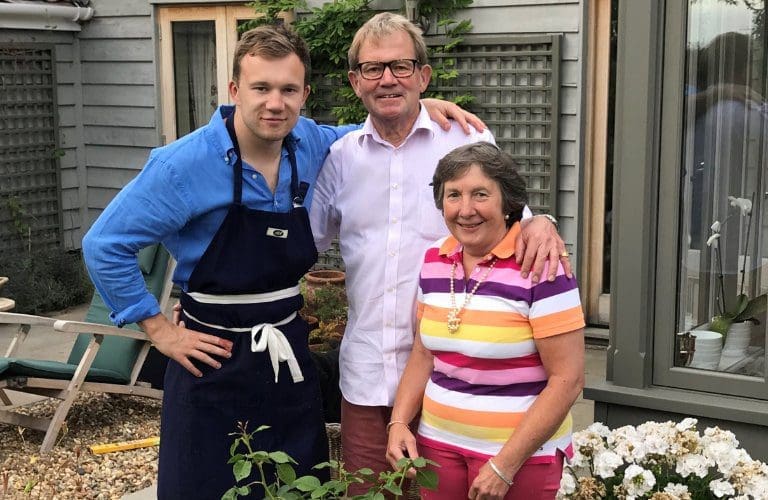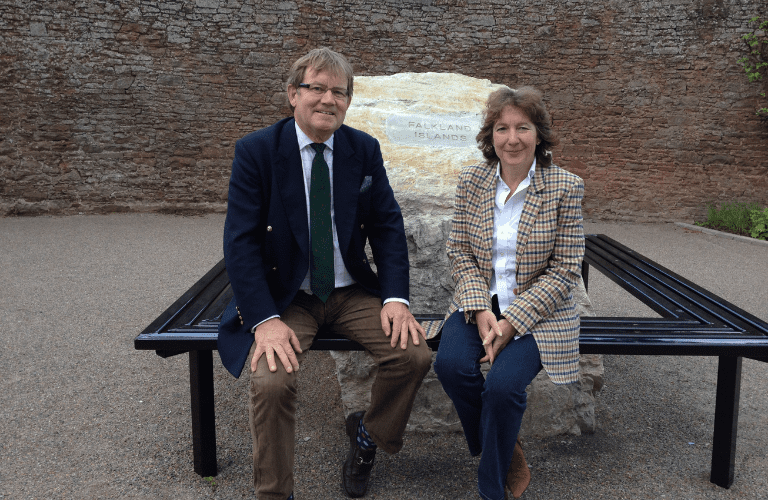Richard’s story: "As a carer, I feel disconnected from support services"
Richard shares his thoughts on dementia care following his wife’s diagnosis of young onset Alzheimer’s disease.

Richard, Joanna and Josh in Switzerland in Spring 2002
I have been married to Joanna for over forty years, with our son Josh born in September 1994. As a family, life before dementia was full of drives to the coast, work in our garden and bedtime stories with Josh – reading was something she enjoyed immensely.
As Joanna reached middle age, these family activities which had always given her such joy, seemed to cause a bit of a lapse in confidence in her instead. She became confused, forgetful and lost pleasure in gardening.
With increasing forgetfulness over two years we went to see our GP, but given that Joanna was relatively young and had many professional achievements in her 30 years as a solicitor, the possibility of dementia seemed remote – but it should still have been investigated far sooner.
A diagnosis of young onset Alzheimer’s disease
For Joanna, she felt she had ‘done something wrong’; this was, of course, far from the truth, but already beginning to see the decline of a once brilliant mind was not only upsetting but tragic. Shortly before Joanna’s 57th birthday in 2015, we were given a diagnosis of young onset Alzheimer’s disease after a dreadfully protracted period of tests. The way the diagnosis was communicated to us was not compassionate at all; any thoughts of a long and happy retirement disappeared with this news.
Despite all this, we were able to move house later in the year so we could be nearer to the coast in Suffolk. After the move, details of Joanna’s situation were not handed over to the local adult and social services – and there was no proactive communication on their part either, which meant that we missed out on important information on which benefits we’d be entitled to.
In March 2017, Joanna became prone to feelings of sickness and headaches. We sought support from the GP, who made a diagnosis of Benign Paroxysmal Positional Vertigo (BPPV). Shortly before this, Joanna had a series of seizures, some of which required hospitalisation. A consultant neurologist confirmed that it was in fact epilepsy and having to cope with this on top of the Alzheimer’s and BPPV was something of a shocking combination.

Outside the family home together in July 2018
Lockdown
A further seizure in February 2020 led to a marked change in her character; she would become more confused, challenging to reason with and physically abusive. This was just before the start of the first lockdown. At a stroke, we were no longer permitted to exercise at the local gym – all that was possible was a daily walk locally. Our son however was a fantastic sounding board for me whilst working from the family home during the pandemic, supporting me through some of the more challenging aspects of Joanna’s care.
In late November 2020, Joanna experienced increased agitation which was causing me to fear for her safety – at one point she swiped her treasured porcelain cats across her dressing table. After one particularly distressing episode, I called 999 and when the paramedics arrived, they confirmed that Joanna had to be admitted to hospital as an emergency under the Mental Health Act.
Time in hospital
Joanna spent just over nine weeks on a hospital ward for patients with dementia and complex needs. I was unable to visit her due to Covid-19 restrictions and so we could not spend our Ruby Wedding Anniversary together. It was hard to know how Joanna was given all the pressures faced by the hospital; the failure of key medical personnel looking after her to communicate with me was appalling; it was lamentable.
The longer Joanna spent on the ward, the more it became apparent that it was the wrong place for her; I could not visit her, but the ward staff told me she became increasingly confused and agitated.
When, finally, she was moved, towards the end of January 2021, she was transferred to a care facility 100 miles from home following the decision of the doctors to discharge. Whilst Joanna is more settled now, the route to get her to this specialist facility had been tortuous, and the fact that this service couldn’t be closer to home has been an added pressure for us all.
A call for change
Overall, the dementia care system is riddled by a lack of ‘joined-up’ thinking; families get lost and I have personal and first-hand experience of a lack of compassion towards Joanna’s care needs as a result. As a carer, I feel disconnected from support services and it’s the family carers who also need to rely on support in the face of often intense responsibilities.
As a family, we also really could have benefited from a single clinical point to support us throughout the stages of dementia; someone who would have been our advocate to expedite Joanna’s care in a fragmented system where there is little accountability. Having this kind of support would have allowed us to draw up care and communications plans at critical moments, such as when Joanna was in hospital – this is a service which I now know Admiral Nurses ably provide and I only wish we had known about them sooner.

Richard and Joanna at a Falkland Islands Memorial in July 2007
More widely, if we are to have a national and integrated NHS and care system, with the requisite level of resourcing then we need to act. I have written to my local MP and attended carers groups to call for change, however this should not be the responsibility of carers. With rising rates of dementia and the crippling effects of the pandemic on families already living with the condition, the Government needs to grasp the nettle so that families with dementia do not continue to fall between the cracks that separate health and social care.
